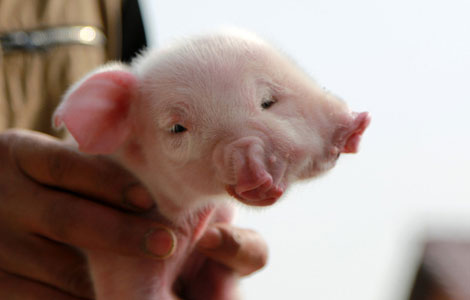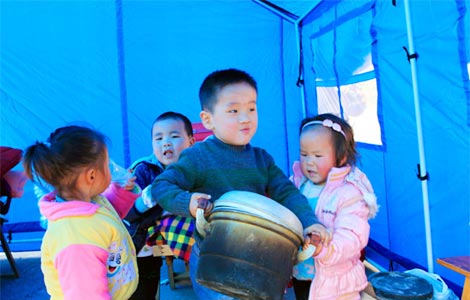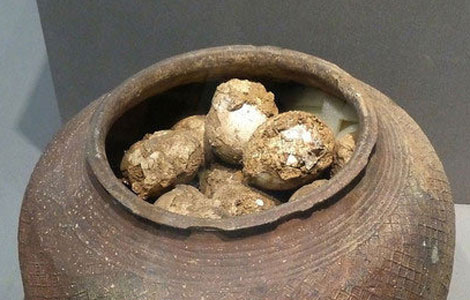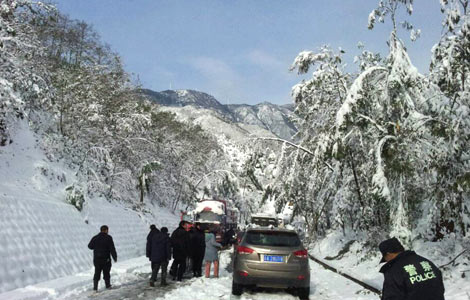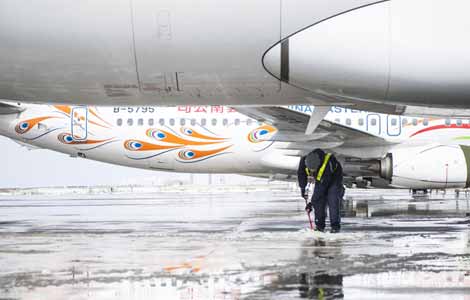

|
|
As one of three pilot national parks in Yunnan province, Laojun Mountain National Park focuses on striking a balance between rational construction planning and ecological protection. As one of the protection measures, the park's management bureau has introduced NGOs to develop local economies and reduce the need for illegal logging and hunting in the forests.
However, an overlap between government bodies has impeded the establishment of unified regulations to act as guidelines for the founding of a national park system, a move that was given the green light at the Communist Party's Third Plenary Session in November.
In February 2009, the Yunnan government approved the establishment of Laojun Mountain which covers 72 hectares across five townships in Yulong Naxi autonomous county in the city of Lijiang.
"Currently, not many people in China understand the concept of national parks and how to run such places," said Zhang Xuemin, director of the Laojun Mountain National Park Management Bureau. "The key aim is to embrace ecological protection, biodiversity research and community progress simultaneously."
The communities in the park are far from easy to handle, however. More than 65 percent of the 24,974 population exists far below the poverty line, with annual per capita income of just 2,300 yuan ($390) in the rural areas. Zhang said a higher standard of living would encourage the locals to protect the environment more effectively.
A four-hour drive southwest to downtown Lijiang brings one to the Jiushijiu Longtan section of the park, lying in primeval forests where signs of human activity are rare. He Changping and his colleagues moved in to start work in 1999, when Lijiang Laojunshan Tourism Development Co obtained the franchise to run the area and build roads and other tourist facilities.
Back then, the workers had to carry rice and other foodstuffs to a campsite near the summit where the Qunlong reception center is now located. This year, 60 million yuan has been plowed into the construction of an 8.5-meter-wide highway leading to the reception center, which lies 1 km from a string of green plateau lakes that are regarded as natural wonders.
Educating the visitors
"The vulnerable environment here won't easily recover if it's damaged, so we encourage visitors by giving them a free breakfast if they recycle their trash. The high altitude means trash decomposes extremely slowly and we have to educate visitors in good habits," said He Changping.
The reception center, which includes a cafe and restrooms, covers 0.22 hectares. According to international standards, set by the UN, land for construction cannot take up more than 1 percent of the park's total area, so a hotel will be built on the same site. If tourism flourishes in the deep forest, the number of visitors will be limited to a maximum 1,000 per day, he said.
The management bureau brought in Beijing Sansheng Environment and Development Institute to provide funds to villagers to enable them to cultivate cash crops and raise bees, thereby lifting local incomes. In Damaidi village, each of the 22 households pays 1,000 yuan a year into a development fund. A further 22,000 yuan is loaned to four families by Sansheng, providing capital of 44,000 yuan per annum.
Last year, Liu Shuncai, the village head, obtained a low-interest loan of 8,000 yuan from the fund to buy 20 beehives. He made a substantial profit by selling the honey, and is still in credit even after servicing his loan every month.
"The income per person in my family doubled to 8,000 yuan last year," he said, adding that four other families have taken out loans to cultivate herbs used in Chinese traditional medicine.
